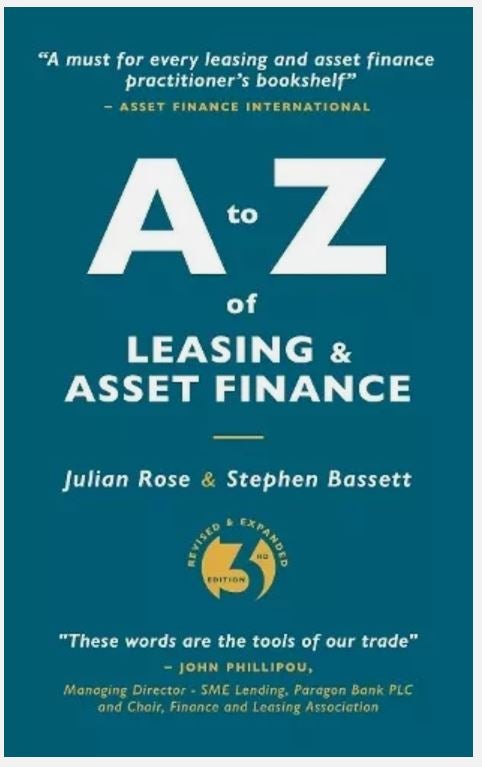Table of Contents Show
New A to Z guide reveals latest trends in asset finance and leasing
Photo Credit: Shutterstock.com
Leasing and asset finance has changed enormously over the years, a fact that has not gone unnoticed by Julian Rose, a charted management accountant who is the founder and director of Asset Finance Policy Limited, an independent consultancy serving the UK asset finance industry.
He was previously head of asset finance at the Finance & Leasing Association (FLA), in an illustrious career that also includes publishing the annual Asset Finance 50 UK report.
Rose has just released the third edition of the A to Z of Leasing & Asset Finance, a definitive 200-plus page guide containing some 450 terms that was first published in 2017. It was originally sponsored by Arkle Finance Ltd (part of the Weatherby’s Group banking division), which contributed content.

Rose co-authors the book with Stephen Bassett, chair of the Guild of Business Finance Professionals, who also has decades of experience working at several firms in the industry, much of it at board director level.
The book is a very popular and comprehensive guide to the vast terminology used in this segment of the business finance market supporting new business equipment and vehicle investment. Rose says that it serves anyone who wants to find out more about the industry. It has also become a big online seller, he points out, with most of the large lessors purchasing it for their employees or their broker partners, for reference purposes and to update their knowledge. Invariably it is geared to the UK market, but it also has a worldwide audience.
New terms
It might seem odd that a book of business terms might require a second, or even third edition, but the changing nature of the industry means that it needs refreshing from time to time. Defunct organisations are excluded, and new terms included, with the authors explaining clearly the specific relevance of these to the asset finance and leasing industry.
Access the most comprehensive Company Profiles
on the market, powered by GlobalData. Save hours of research. Gain competitive edge.

Company Profile – free
sample
Thank you!
Your download email will arrive shortly
We are confident about the
unique
quality of our Company Profiles. However, we want you to make the most
beneficial
decision for your business, so we offer a free sample that you can download by
submitting the below form
By GlobalData
Country *
UK
USA
Afghanistan
Åland Islands
Albania
Algeria
American Samoa
Andorra
Angola
Anguilla
Antarctica
Antigua and Barbuda
Argentina
Armenia
Aruba
Australia
Austria
Azerbaijan
Bahamas
Bahrain
Bangladesh
Barbados
Belarus
Belgium
Belize
Benin
Bermuda
Bhutan
Bolivia
Bonaire, Sint
Eustatius
and
Saba
Bosnia and Herzegovina
Botswana
Bouvet Island
Brazil
British Indian Ocean
Territory
Brunei Darussalam
Bulgaria
Burkina Faso
Burundi
Cambodia
Cameroon
Canada
Cape Verde
Cayman Islands
Central African Republic
Chad
Chile
China
Christmas Island
Cocos Islands
Colombia
Comoros
Congo
Democratic Republic
of
the Congo
Cook Islands
Costa Rica
Côte d”Ivoire
Croatia
Cuba
Curaçao
Cyprus
Czech Republic
Denmark
Djibouti
Dominica
Dominican Republic
Ecuador
Egypt
El Salvador
Equatorial Guinea
Eritrea
Estonia
Ethiopia
Falkland Islands
Faroe Islands
Fiji
Finland
France
French Guiana
French Polynesia
French Southern
Territories
Gabon
Gambia
Georgia
Germany
Ghana
Gibraltar
Greece
Greenland
Grenada
Guadeloupe
Guam
Guatemala
Guernsey
Guinea
Guinea-Bissau
Guyana
Haiti
Heard Island and
McDonald
Islands
Holy See
Honduras
Hong Kong
Hungary
Iceland
India
Indonesia
Iran
Iraq
Ireland
Isle of Man
Israel
Italy
Jamaica
Japan
Jersey
Jordan
Kazakhstan
Kenya
Kiribati
North Korea
South Korea
Kuwait
Kyrgyzstan
Lao
Latvia
Lebanon
Lesotho
Liberia
Libyan Arab Jamahiriya
Liechtenstein
Lithuania
Luxembourg
Macao
Macedonia,
The
Former
Yugoslav Republic of
Madagascar
Malawi
Malaysia
Maldives
Mali
Malta
Marshall Islands
Martinique
Mauritania
Mauritius
Mayotte
Mexico
Micronesia
Moldova
Monaco
Mongolia
Montenegro
Montserrat
Morocco
Mozambique
Myanmar
Namibia
Nauru
Nepal
Netherlands
New Caledonia
New Zealand
Nicaragua
Niger
Nigeria
Niue
Norfolk Island
Northern Mariana Islands
Norway
Oman
Pakistan
Palau
Palestinian Territory
Panama
Papua New Guinea
Paraguay
Peru
Philippines
Pitcairn
Poland
Portugal
Puerto Rico
Qatar
Réunion
Romania
Russian Federation
Rwanda
Saint
Helena,
Ascension and Tristan da Cunha
Saint Kitts and Nevis
Saint Lucia
Saint Pierre and Miquelon
Saint Vincent and
The
Grenadines
Samoa
San Marino
Sao Tome and Principe
Saudi Arabia
Senegal
Serbia
Seychelles
Sierra Leone
Singapore
Slovakia
Slovenia
Solomon Islands
Somalia
South Africa
South
Georgia
and The South
Sandwich Islands
Spain
Sri Lanka
Sudan
Suriname
Svalbard and Jan Mayen
Swaziland
Sweden
Switzerland
Syrian Arab Republic
Taiwan
Tajikistan
Tanzania
Thailand
Timor-Leste
Togo
Tokelau
Tonga
Trinidad and Tobago
Tunisia
Turkey
Turkmenistan
Turks and Caicos Islands
Tuvalu
Uganda
Ukraine
United Arab Emirates
US Minor Outlying Islands
Uruguay
Uzbekistan
Vanuatu
Venezuela
Vietnam
British Virgin Islands
US Virgin Islands
Wallis and Futuna
Western Sahara
Yemen
Zambia
Zimbabwe
Kosovo
Industry *
Academia & Education
Aerospace, Defense &
Security
Agriculture
Asset Management
Automotive
Banking & Payments
Chemicals
Construction
Consumer
Foodservice
Government, trade bodies
and NGOs
Health & Fitness
Hospitals & Healthcare
HR, Staffing &
Recruitment
Insurance
Investment Banking
Legal Services
Management Consulting
Marketing & Advertising
Media & Publishing
Medical Devices
Mining
Oil & Gas
Packaging
Pharmaceuticals
Power & Utilities
Private Equity
Real Estate
Retail
Sport
Technology
Telecom
Transportation &
Logistics
Travel, Tourism &
Hospitality
Venture Capital
Tick here to opt out of curated industry news, reports, and event updates from Leasing Life.
Submit and
download
Visit our Privacy Policy for more information about our services, how we may use, process and share your personal data, including information of your rights in respect of your personal data and how you can unsubscribe from future marketing communications. Our services are intended for corporate subscribers and you warrant that the email address submitted is your corporate email address.
According to Rose, there are some 40 to 50 new terms in this latest third edition. They range from Arena Television, Lumina, Zero Emissions Vehicles and myriad other ESG references, to the new Guild of Business Finance Professionals and Consumer Duty, since the FCA introduced new rules and an additional principle for higher and clearer standards of consumer protection in 2023.
Also included for the first time is the Economic Crime Levy that was introduced this year. This is payable by lessors whose UK revenue exceeds £10.2 million, ranging from £10,000 for medium-sized enterprises to £250,000 for very large corporations.
Although the levy may well be merited as the means to increase funding for developing a long-term solution to tackle economic crime, the authors note that it can represent a significant extra overhead for some large dealers of assets with relatively small own book leasing operations. Around 200 of the existing terms have also been updated to include more recent information and data.
Rose explains that there had not been a general guide to the industry for decades. This gave him the idea that it would be a useful resource to develop, with the starting point his own personal experience working at the FLA.
However, Rose is eager to point out there have been many experts involved from the beginning, all suggesting what should be included and contributing to the definitions. This has meant that each of the three editions has taken several months to complete, with Bassett proving an able companion for the task, in a supporting role.
This help has proved crucial too, as one of the most difficult of all the terms to define is in their words also the most fundamental one, that being leasing, which receives special treatment.
Changing times
The A to Z underlines the fact the two authors have witnessed many changes over the years concerning the way in which the industry is practised, and how digitisation and automation have altered its operational nature. They have also observed how debates and subsequent developments have shaped the market, including the role of government regulation.
Rose points out that the guide attempts to cover the key regulatory terminology using a sensible approach, given that only a small share of total lending is regulated. Asset finance is generally an unregulated product in the UK, he points out, as most customers are neither individuals, nor unincorporated businesses. “The regulation of unincorporated business finance is a major challenge for the industry,” he reinforces, “because the rules are not written with businesses in mind.”
Meanwhile, the changes in technology have clearly been huge, of which Artificial Intelligence is now, and will likely continue to be the ‘game-changer.’ Neither would profess to be an expert in this area, although naturally the A to Z includes several relevant definitions as well as highlighting the main areas in which AI may be relevant.
They include the ability to use large amounts of data to predict credit risk; analysing transaction data alongside other information to highlight potentially fraudulent transactions; enabling lessees to extract key information from large numbers of lease contracts for preparing accounting information; and automating routine operations, including capturing information from invoices and other paperwork.
Bassett notes that digitisation and the use of various applications are improving the speed and efficiency of lending, making the onboarding and approvals process quicker. Automation is a double-edged sword, though, as it could potentially increase the level of attempted fraud. “The desire to improve efficiency and lower costs are important aims, but these must be balanced against containing risk and the need for responsible lending,” he says.
Lenders are always trying to get ahead of the fraudsters, and as Bassett highlights, there are multiple tools available to do this. He particularly notes the role of Lumia, operated by the insurance company Acquis, which was launched in 2023 and is referred to in the latest edition of the A to Z.
Lumia emerged as a market response to the Arena Television fraud case, whereby Kroll Advisory alleged that Lloyds Banking Group enabled Arena TV directors to misappropriate over £1.2 billion in asset-based lending. It aims to provide a clear insight into a customer’s lending exposure via data sharing by responsible lenders, which alerts other cooperating lenders to undisclosed or rapidly increasing borrowing and possible fraudulent activity such as falsified balance sheets or dual financing.
Constant change
As for where we are, the industry is certainly coping well since the shock of the Covid pandemic that erupted in 2020. As Rose is keen to point out, “after every economic shock it is asset finance that recovers quicker and stronger than other types of business finance.”
But there are invariably nuances that Basset wants to stress, noting that the tectonic plates of the asset finance and lending markets are “starting to shift slightly.”
Bassett notes that the number of broker intermediaries seems to grow on a daily basis, yet one or two bank-owned lenders have closed their doors to the market this year, probably due to capital requirements and relative returns. He goes on to say that if the looming threat of potential commission reimbursements comes to pass this might accelerate.
Still, he says there are new banks popping up showing some interest and, “currently still plenty of pre-existing independent funders operating what is a relatively safe market.
“Provided you know what you are doing,” he adds.
Economic pressures also indicate that “overall demand for borrowing will likely increase next year, but creditworthiness will become a growing issue,” says Bassett.
This makes him believe that the gap between those who want funding and those who can obtain funding at reasonable rates will probably expand further.
These changes will likely lead to new terms springing up, and that in turn is likely to keep Rose and Bassett busy in future when they eventually have to refresh their essential guide.
Julian Rose & Stephen Bassett A to Z Guide of Leasing and Asset Finance is published by UK Book Publishing and is available via Amazon UK and eBay UK.









